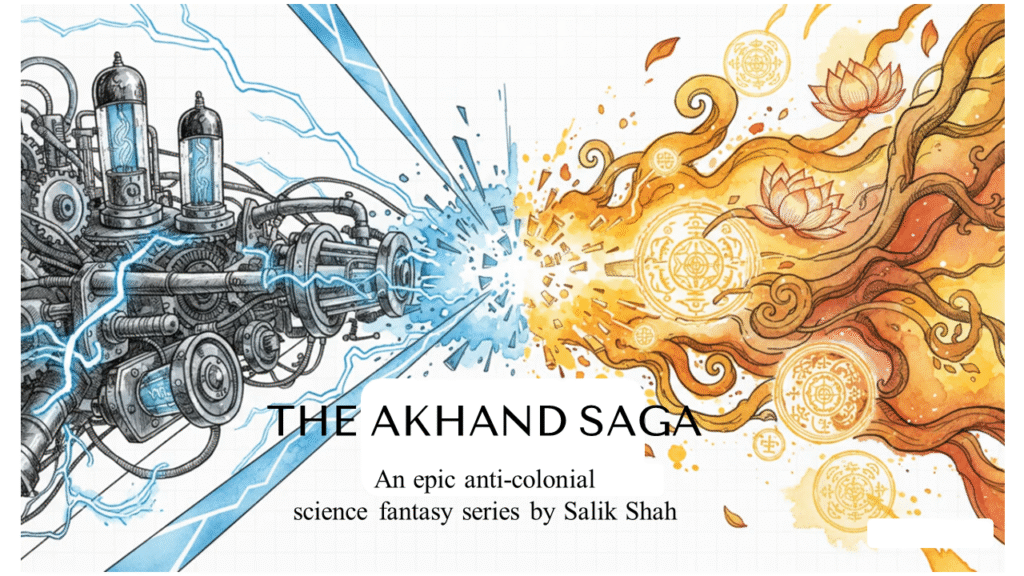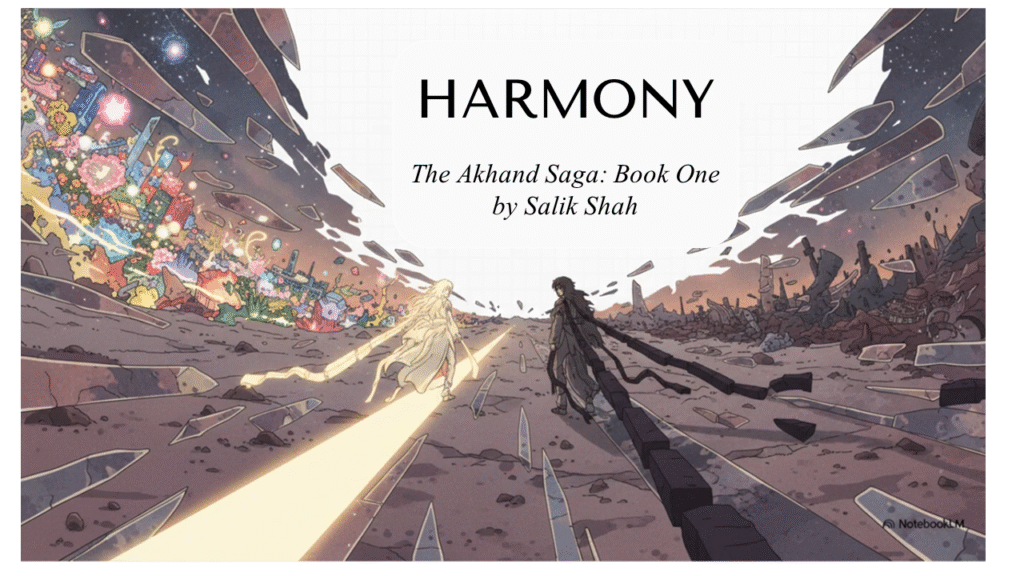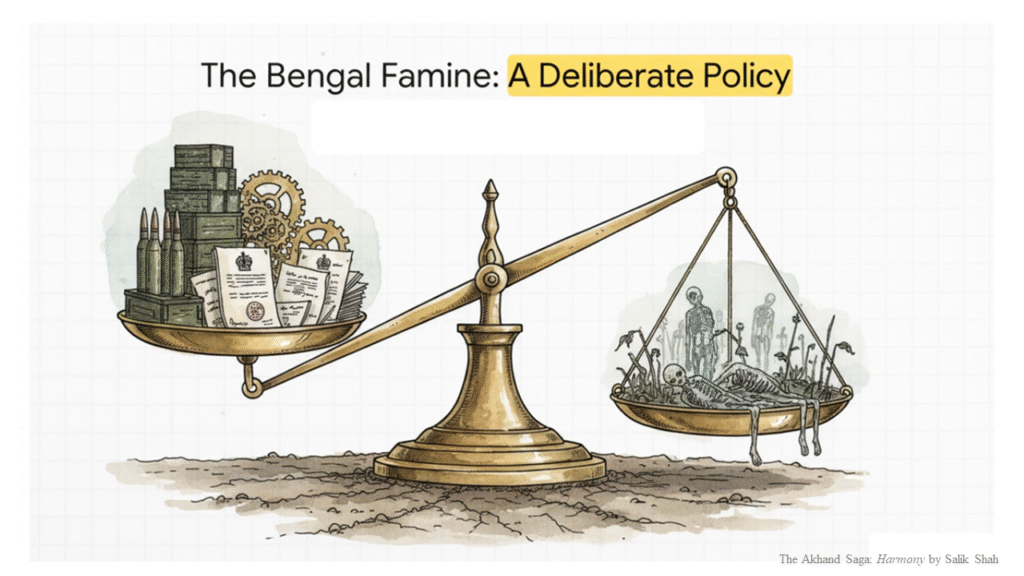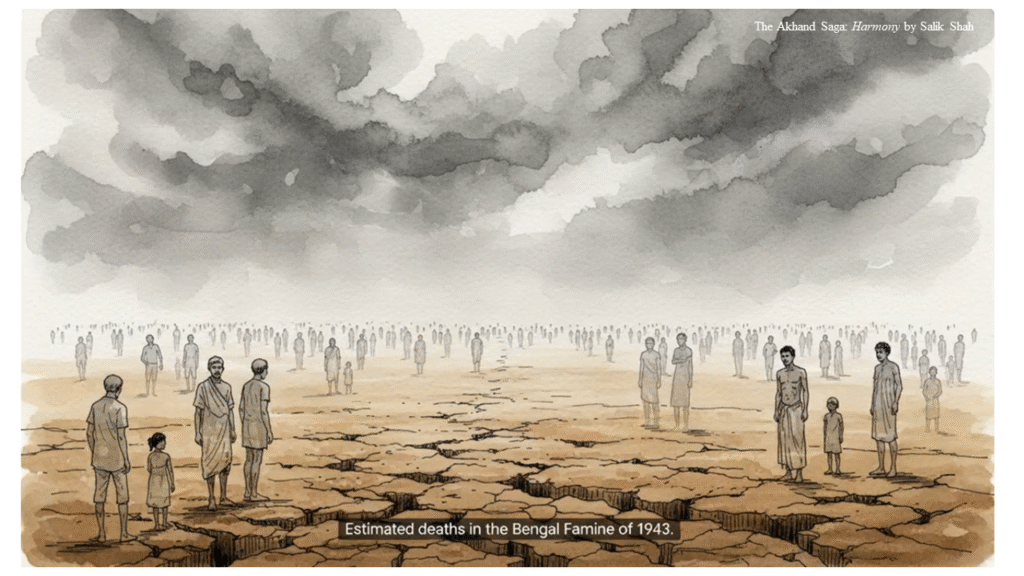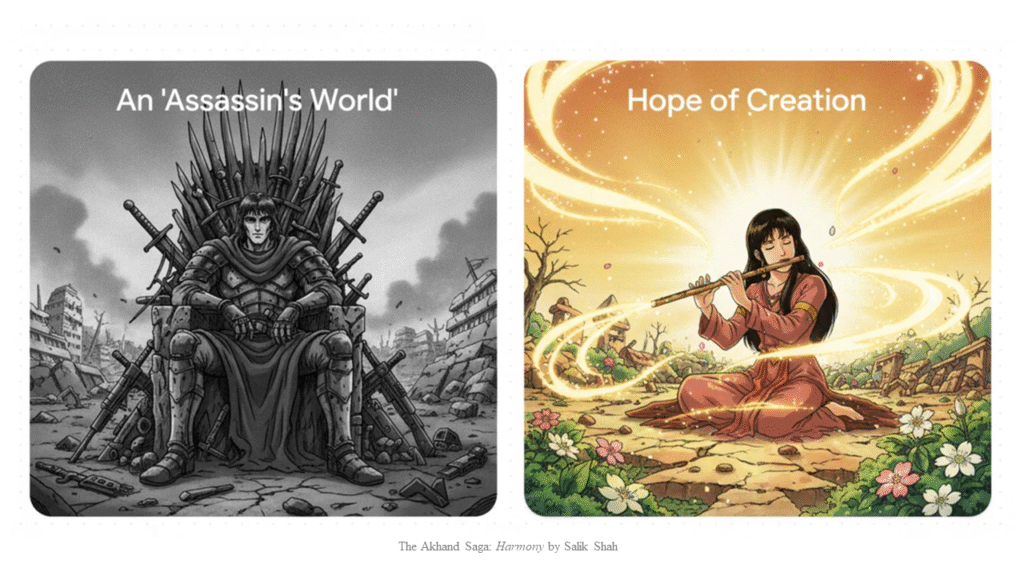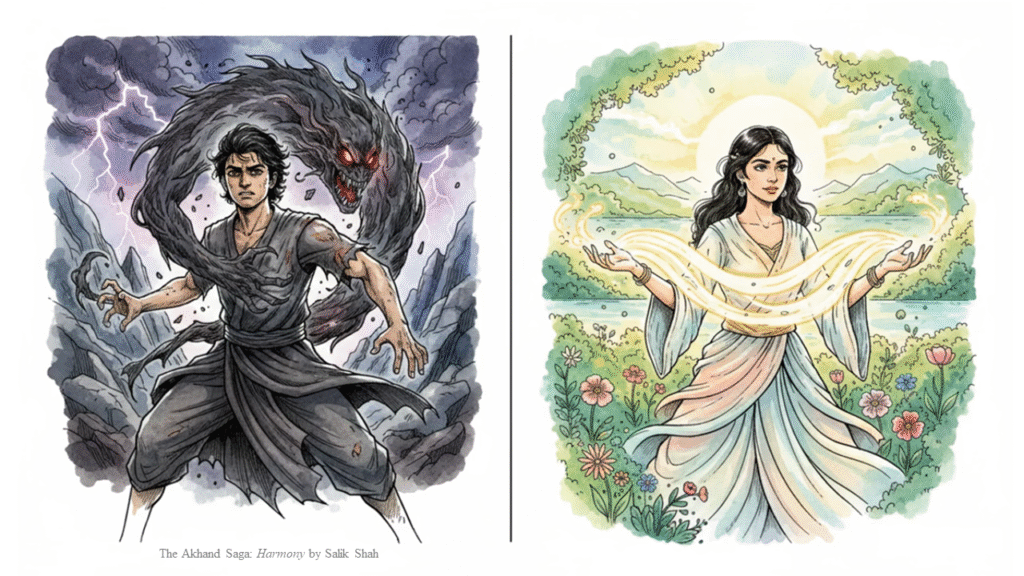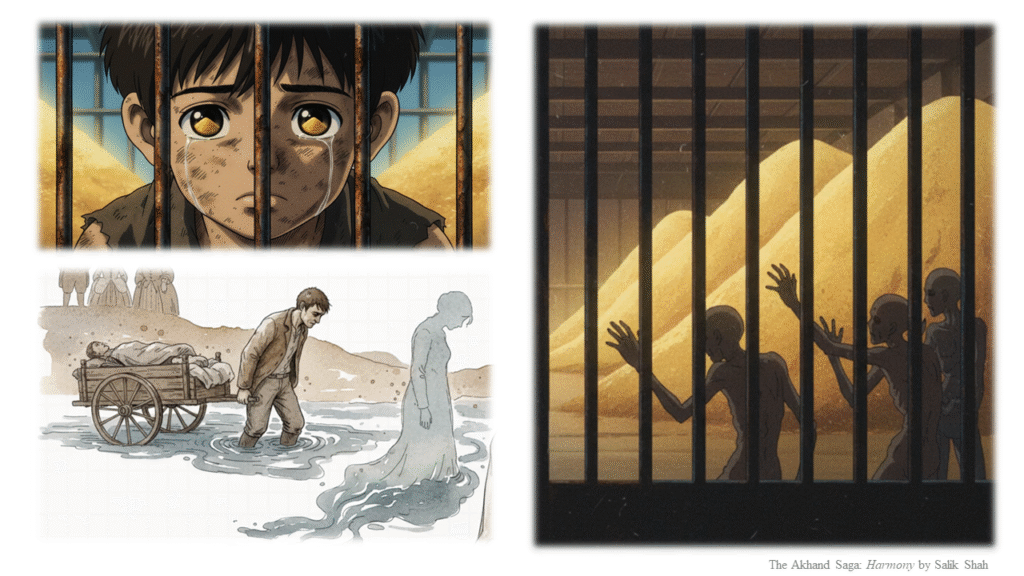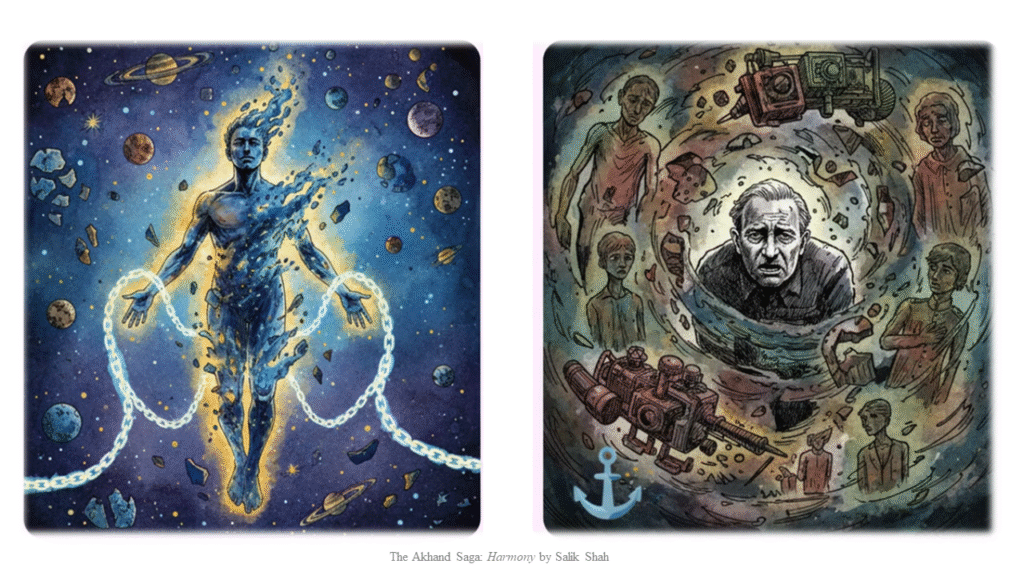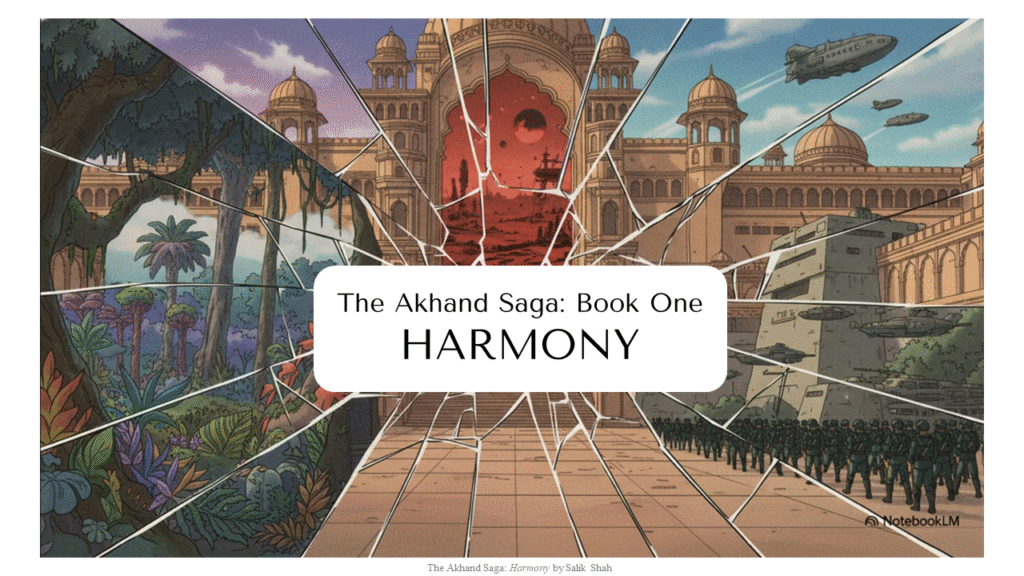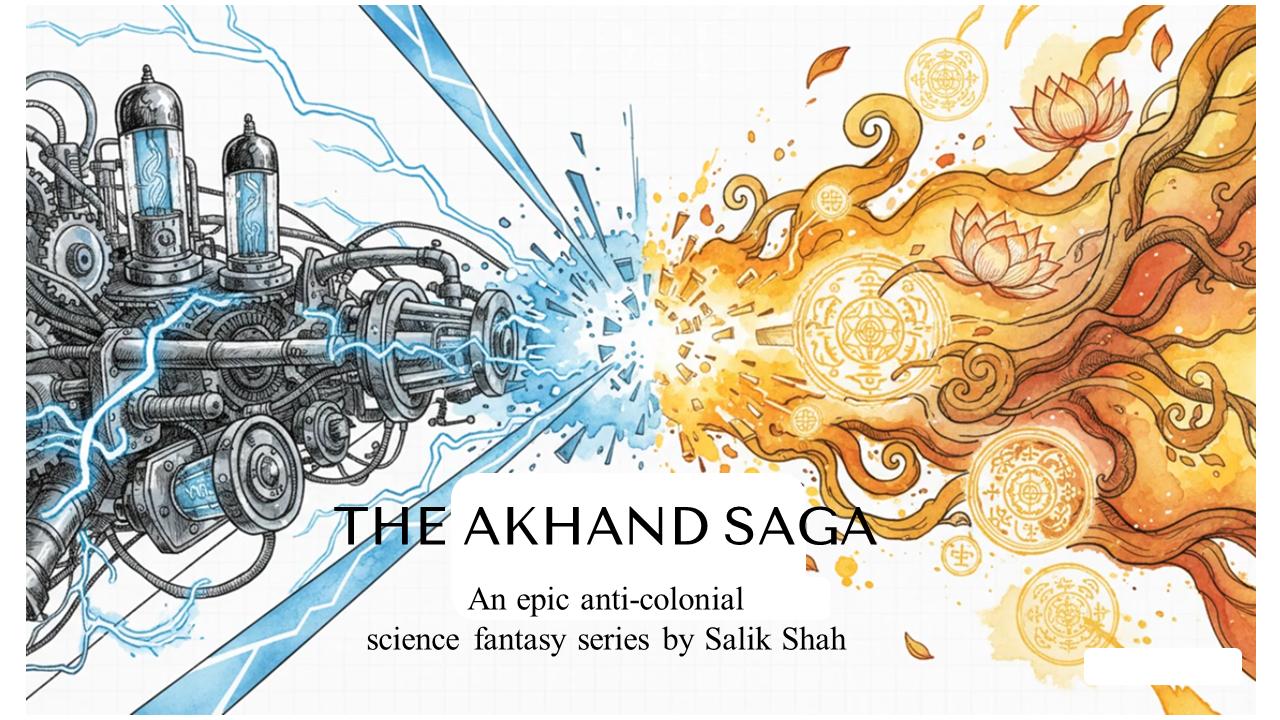After eight months of intensive rewriting, rethinking, and rebuilding, I’ve submitted the revised manuscript for the first book of the Akhand Saga to an amazing agent and editorial team. What began as an answer to their March feedback has transformed into something far more ambitious—and far more demanding—than I initially imagined.
Harmony is an anti-colonial, genre-bending science fantasy epic set against the Bengal Famine of 1943 and the machinery of the Second World War. It’s an alternate history with metaphysical stakes, a historical thriller with cosmic consequences. The current draft stands at approximately 350,000 words—a necessary length when you’re wrestling with both documented genocide and the metaphysical architecture that allows such atrocities to persist.
The Akhand Saga
Spanning five distinct eras of Indian history, the Akhand Saga is an epic work of speculative fiction that reframes the struggle against empire as a cosmic conflict. Grounded in meticulously researched history—from the Bengal Famine of 1943 to the Partition and the rise of a new world order—the series blends historical fact with a unique metaphysical system where consciousness is a weapon, ancient myths are living history, and justice is a force that transcends death.
It is an unsparing look at the legacy of colonialism, the nature of resistance, and the generation-spanning war to build an “Akhand Bharat”—an unbroken, undivided India—against forces that seek to control not just land, but memory, reality, and the future itself.
Harmony is the first installment in this original epic series.
Winston Churchill
I never intended to write a biographical novel about Winston Churchill.
But somehow, in my attempts to understand the origins of his calculated cruelty—to trace the roots of a man who could engineer famine as policy, who could document three million deaths in a blood-red ledger as “acceptable losses”—that’s exactly what I ended up doing. Not a hagiography, not an apology, but an autopsy. A dissection of how empire builds its architects, brick by brick, choice by choice, until a man can look at mass starvation and see only strategy.
The challenge was humanization without redemption. To show the formation of a monster without excusing monstrosity. To understand evil without forgiving it.
It was the hardest writing I’ve ever done.
Bengal Famine
The Bengal Famine killed over three million people. Three million.
How do you write that number without it becoming abstract? How do you make a reader feel the scale of calculated genocide when the human mind struggles to comprehend suffering beyond a certain magnitude? How do you honor the dead without turning them into narrative props?
I was in tears writing many of the famine scenes. The emotional toll of immersing yourself in such barbarity—of documenting skeletal children, of warehouses overflowing with grain while people starve, of policy memos that treat human lives as mathematical variables—is staggering. There were days I couldn’t write. Days I had to step away because the horror was too immediate, too visceral.
But it was necessary.
To my unexpected delight, Amartya Sen—who as a child witnessed the famine firsthand—makes a cameo in the novel. Writing his perspective, imagining what that young boy carried forward into his life’s work on poverty and famine economics, became one of the most profound moments of this entire project. His presence is brief, but it anchors the novel in lived memory, in testimony that survived.
India—A Vast Epic
The history of India cannot be compressed into a shorter book.
That’s the fundamental challenge anyone faces when tackling subjects of this magnitude. How do you make well-known (or deliberately forgotten) history feel urgent and relevant? What new insights can speculative fiction bring that traditional historical novels cannot? How can your work help a nation’s conscience heal after a man-made tragedy of such barbarity and scale?
These weren’t rhetorical questions. They were the questions that shaped every structural decision, every character arc, every metaphysical system I built into the narrative.
As a writer, I find realism alone can’t capture the feeling of living under empire these days—the way oppression becomes infrastructure, the way violence becomes policy, the way systems adapt even when architects fall. You need speculative elements. You need metaphysics that could externalize the interiority of characters and the land itself.
The result is science fantasy grounded in historical atrocity. Cosmic stakes married to documented genocide. A novel that refuses to let readers escape into pure fantasy while simultaneously demanding they imagine what resistance looks like when the enemy isn’t just an army but an entire machinery of extraction.
The novel has over half a dozen main protagonists and more than a dozen significant supporting characters.
This wasn’t an aesthetic choice—it was a necessity. No single perspective can hold the weight of what this story demands.
Each voice is essential. Together, they form a powerful, polyphonic story that reflects the reality of resistance: it is never one hero, never one sacrifice, never one choice. It is collective, costly, and ongoing.
Books in the Series
There are five eras that I have planned for the series, covering five periods of Bharat/Indian history.
I’ve already written drafts for the next cycles of the Akhand Saga—the books that explore what comes after this foundational conflict.
But a strange thing happened during the revision process: a gap opened up between these two eras. A narrative chasm that demands its own book.
I hadn’t planned for this. But the novel’s ending—which centers on the Partition and the transformation of imperial machinery from overt violence to covert financial and political control—revealed a missing bridge.
The fall of the British Empire and the rise of a new world order (atomic weapons, neocolonial infrastructure, the Cold War’s shadow politics) is its own epic. The story of how empires don’t die—they evolve, adapt, shed their skin and survive in new forms—needs its own space.
So the series has expanded. What was once a trilogy is now at least four books, possibly five – the numbers depend on the final length of each book. The Akhand Saga isn’t just about India’s resistance to empire—it’s about the long, grinding, generation-spanning war to dismantle imperial machinery that constantly reconfigures itself.
The Struggle and the Necessity
I won’t lie: this project has been grueling.
The research alone—diving into famine economics, Churchill, British colonial policy, WWII military strategy, Indian independence movements, metaphysical philosophy, consciousness theories—took months.
The emotional weight of sitting with atrocity every single day took its toll. The structural complexity of weaving multiple timelines, multiple protagonists, and metaphysical systems into a cohesive narrative nearly broke me several times.
There were moments I questioned whether this was worth it. Whether anyone would care. Whether a 350,000-word anti-colonial science fantasy epic set during the Bengal Famine had any place in contemporary publishing.
But then I’d remember the three million dead. The millions more whose suffering was erased, whose names were lost, whose stories were never told because empire writes the dominant histories.
And I’d keep writing.
Because if literature can’t name atrocity with precision, if it can’t imagine resistance with ferocity, if it can’t demand justice from the architects of genocide—then what is it for?
View this post on Instagram
Twenty years, this year, every day and night.
The Akhand Saga begins… with Harmony.
The first book in my original science fantasy series set on the alternate world of Jaya.
I finished revising, rewriting, editing, and cutting the manuscript to ~125-150k words for the first… pic.twitter.com/CyMyP23UoD
— Salik Shah ✨🚀 (@salik) October 18, 2024
What’s Next
The manuscript is now with the agent team. The submission materials—logline, synopsis, and pitch package—are finalized and ready. Hopefully, we can start to shop it to publishers, to find the right home for a project this ambitious and uncompromising.
I’m cautiously optimistic. The current geopolitical moment—the renewed focus on decolonial thinking, the urgent questions about imperialism’s legacy, the global conversations about accountability and historical memory—makes this novel feel timely in ways I didn’t anticipate when I started writing the genesis of this book four years ago in a remote village in Jharkhand.
But regardless of what happens next, I know this: Harmony is the most important thing I’ve written. It’s the novel series I needed to write, the story that demanded to be told.
And the Akhand Saga is just beginning.
— Salik Shah
November 1, 2025
PS. Updates to follow as the submission process unfolds. Thank you to everyone who’s supported this journey—your encouragement has meant everything.
PSS.
I love these illustrations drawn for the book by Google NotebookLM!
